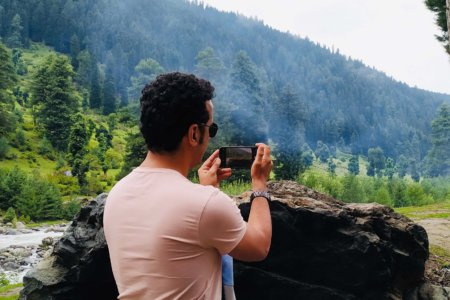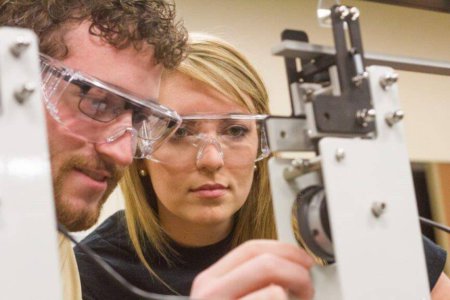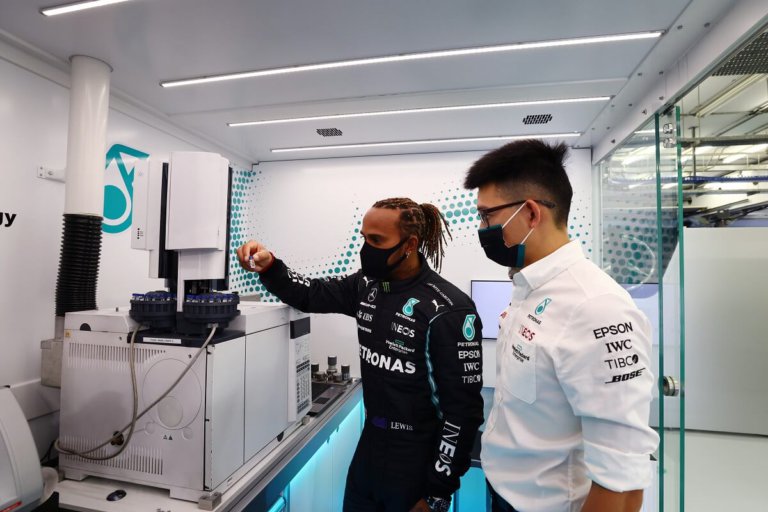
Working on a race track with the likes of 98-time F1 Grand Prix winner Lewis Hamilton is the stuff of dreams — and this Malaysian engineer is now living the dream in Italy. En De Liow caught his breakthrough through the PETRONAS Global Talent Search, emerging from a sea of a thousand applications last year. Today, he is a PETRONAS Trackside Fluid Engineer maintaining the cars of drivers like Hamilton.
Having studied in both the US and the UK, this engineer has experienced an enriching international student journey. “In both experiences, I’ve been blessed with institutions that provide tremendous guidance and resources to students who want to go the extra mile and get the most out of their education,” he shares.
Liow recalls how his hiring interview with PETRONAS Lubricants International CEO Giuseppe D’Arrigo went beyond the job scope, “seeking to understand character and principles.” “It is not often that you are presented with opportunities such as this and I am very grateful to have been selected to work in Formula 1 (F1), which has been a lifelong dream,” he tells Study International. Read more on his career here:
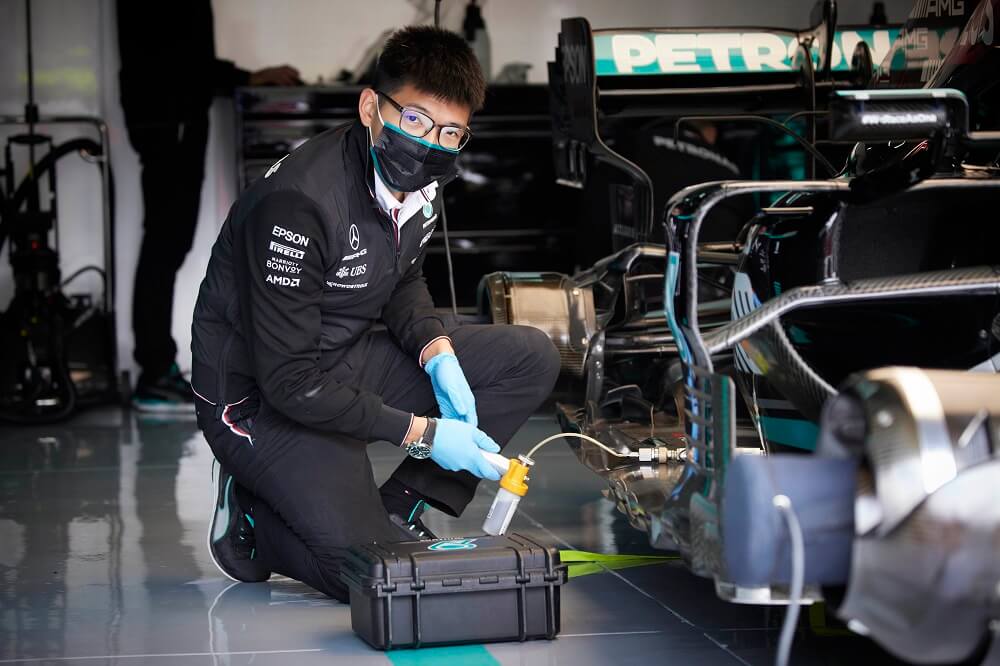
Liow strikes a pose while working at the 2021 Emilia Romagna Grand Prix. Source: Steve Etherington
What sparked your interest in cars and automotive racing?
The passion started at a very young age, more than just in motorsports but a passion for cars and machines in general. My uncles were into cars and that sparked my interest in machines and helped cultivate that inherent desire to understand how things work. In university, having the opportunities to work with amazing machines and electronics, whilst understanding how thousands of components come together to work harmoniously was really enjoyable. Being able to work with these machines helped fuel that passion further.
On top of that, working with the team at PETRONAS Lubricants International, including the team of engineers and experts behind the Fluid Technology Solutions™, helped me see the importance of what we do in the real world. There is a great deal of teamwork and cooperation needed behind the scenes.
Tell us about your education pathway that got you to be a part of Mercedes’s team with Lewis Hamilton.
I completed my high school education at a co-ed government missionary school in Malaysia and was blessed to have the opportunity to pursue my tertiary education in the United States, completing my degree in Mechanical Engineering at the University of Massachusetts in Boston. I then decided to deepen my understanding of the field by pursuing a master’s degree in the United Kingdom, at Coventry University. There were also two internship opportunities at significant automotive companies that I pursued, to further refine my technical skills and knowledge.
I believe that it’s important to stay curious and to absorb as much as you can. Learning goes beyond school and for me, it’s about learning as much as I can from the people around me – my mentors, teammates, parents, and friends – and understanding the values that you want to adopt. Hopefully, those values will be shared by the organisations that you work for. Fortunately for me, that was the case, so I’m absolutely grateful and blessed to be in my current position.
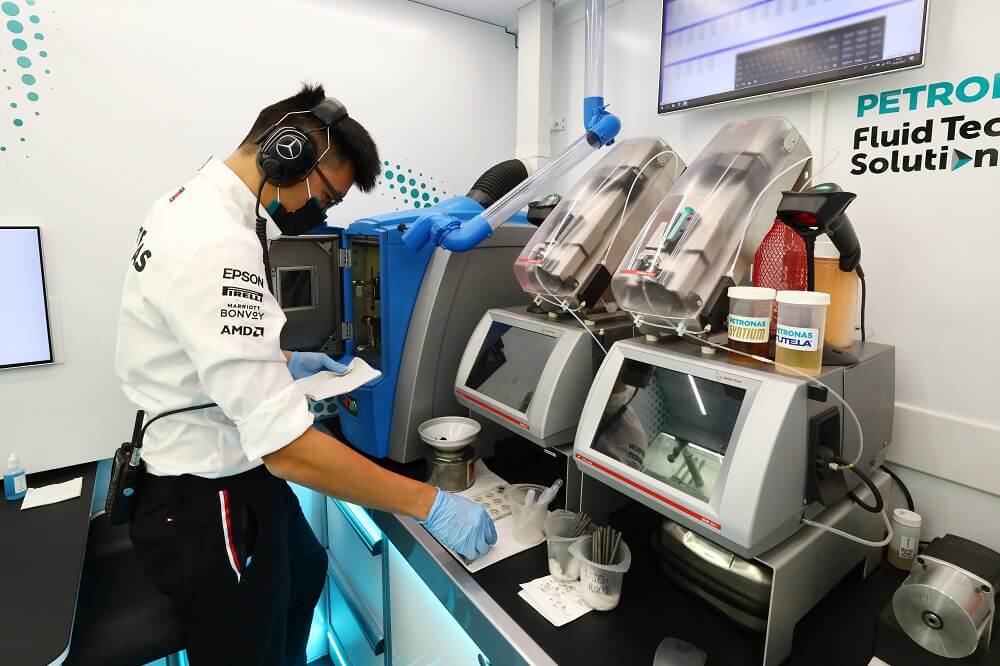
Liow’s childhood interest in cars led to a fulfilling trackside career. Source: Steve Etherington
What do you enjoy most about living and working in Italy?
I think the work-life balance here has been stellar and having great colleagues and a healthy work culture are key to that. When it is safe to do so again, I look forward to driving along the Italian Riviera or going hiking in the Alps, both of which are not far from Turin.
What exactly do you do as a PETRONAS Trackside Fluid Engineer?
As a PETRONAS Trackside Fluid Engineer, I am tasked with the crucial job of ensuring that the fluids supplied by PETRONAS (Primax fuel, Syntium engine oils and Tutela gearbox and functional fluids) are up to standard and in compliance with FIA regulations. In short, I am responsible for keeping the PETRONAS fluids, the lifeblood of the cars, in optimum condition at each race and ensuring that the fluids are all compliant with the regulations before we put them in the car.
I monitor the reliability of the engine and gearbox throughout the entire race weekend. When it comes to the engine and gearbox, my trackside laboratory colleague Stephanie Travers and I both watch out for excessive wear on these two hardware pieces by using a spectrometer to analyse samples of the oils throughout a race weekend.
The spectrometer works similarly to doing a blood test on a human, because we can see all the different metals within each oil sample. The tests are used as a diagnostic tool to give a snapshot of what is happening inside the engine and gearbox. Particles in the oil, indicative of engine degradation, provide the team with an early warning of any problems. This allows us to detect looming engine failures or gearbox problems. Therefore, it is very important for us to do the analysis as soon as we get the samples so we can track the progress and monitor the reliability of the car.
After the cars come back after a session, we will check the oil to make sure that the car’s condition is healthy by looking at the wear metals and the viscosity of the oil. This way, we can identify any potential problems through the oil analysis before we even feel any vibrations coming from the car. That’s how we work with the rest of the engineers and experts to make sure that the car is in good health for the race.
When it comes to the fuel, we monitor this using a gas chromatograph. With this machine, we analyse samples of the fuel and ensure that it matches the sample of fuel that has been supplied to and approved by the Fédération Internationale de l’Automobile (FIA) before going out on track. We are also responsible for ensuring that all fluids are not contaminated.
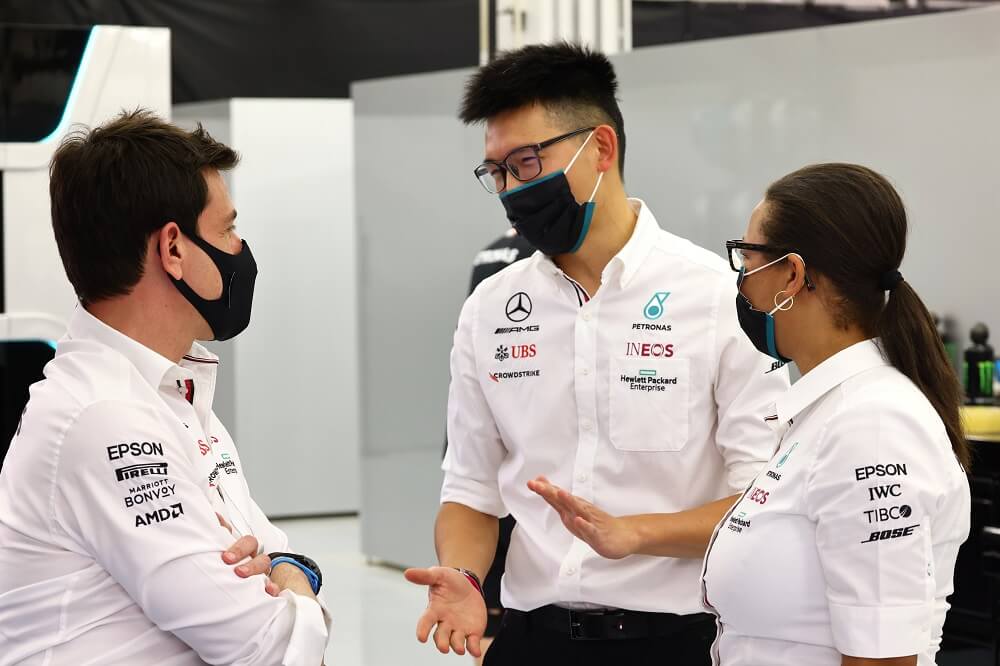
Liow credits his colleagues for helping make the long work hours worthwhile. Source: Etherington
What are some of the challenges that you face in this role, and how do you overcome them?
The role does require long working hours at times. From arriving trackside on the Tuesday of race week to leaving late on a Sunday night, the long hours and hard work are dedicated to ensuring that a race weekend runs smoothly. I am responsible for the fuel and lubricants for every race in the F1 calendar, which adds to the pressure of ensuring perfection is met.
Our Fridays are usually the toughest, as we need to arrive early and leave very late at night. This is indeed challenging for us. However, we have a great team with us that makes the long hours worthwhile. I overcome these challenges by keeping my inner cool and remembering that I have an entire team that I get to work with. It also helps that I actually enjoy the work that I do!
Do you have any advice for students who are considering a career in this field?
Strive to develop your technical skills and soft skills like clear communication and character building. These skills and your character will set you apart from the others. On top of that, there are plenty of opportunities to deepen your understanding of the industry so, where possible, consider opportunities for higher education. This will take you further in the long term.
A tip for life as well: don’t be afraid of going after what you really want. Every failure is an opportunity for us to rise above, so work hard and keep pursuing that passion.









